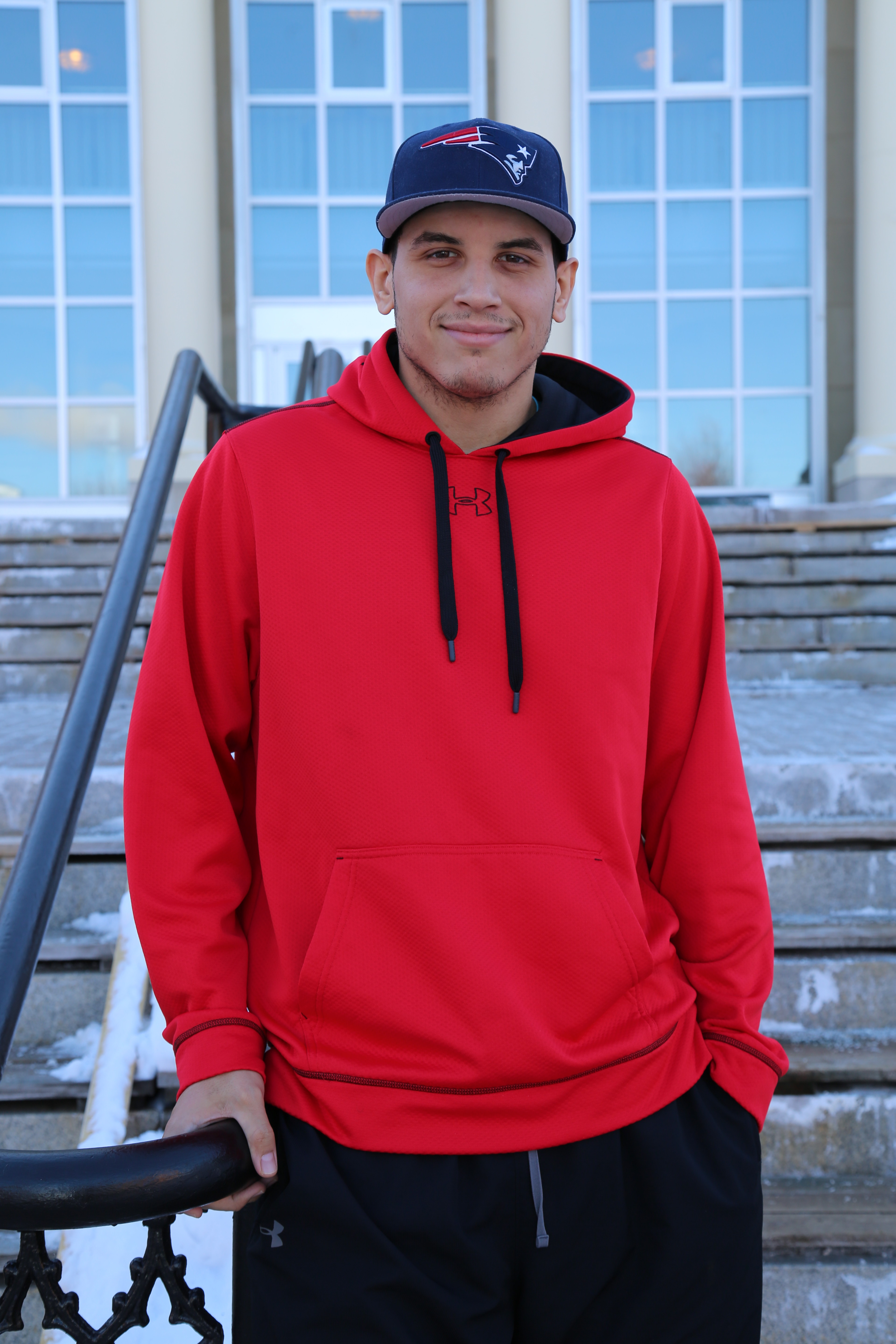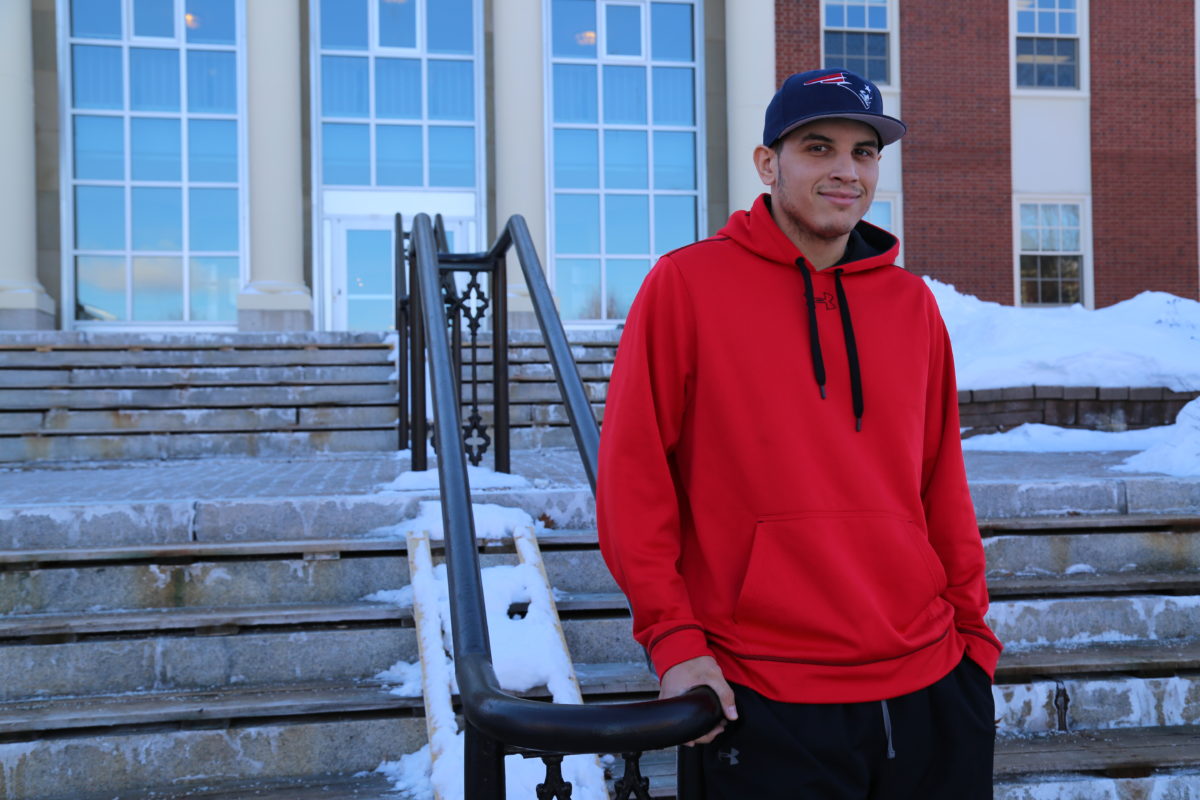 Jeremy Speller spent much of his childhood moving from Quebec to Massachusetts to Nashua, New Hampshire. The 6-3 forward for St. Thomas University’s men’s basketball team played basketball because families from Section 8 households can’t afford much else. Despite his travels he still considers Gesgapegiag, Q.C., home.
Jeremy Speller spent much of his childhood moving from Quebec to Massachusetts to Nashua, New Hampshire. The 6-3 forward for St. Thomas University’s men’s basketball team played basketball because families from Section 8 households can’t afford much else. Despite his travels he still considers Gesgapegiag, Q.C., home.
“Even though I didn’t live most of my years there, that is home to me. That’s where I lived in my first house,” said the 27 year old. “In the United States I never lived in a house; I was always moving from apartment to apartment. Home for me is definitely my First Nation Community.”
Speller hopes the game he loves can help the young people of his community stay away from drugs and alcohol.
“I grew up in that kind of environment and I know how hard it is growing up in that kind of environment,” said the third-year political science major. “At this point I just want to find ways to give back so they have better opportunities and go to school and get a career.”
He wants the young people in his community to avoid drugs and alcohol because someone close to him formed a heroin addiction.
“There’s someone close to me that because I think what he went through in life, shaped his decisions and now he’s on heroin.”
Speller said that person is now been clean for four or five months, but he saw how devastating it was for that person’s family. He thinks sports can help.
“I would love to see my community build a wellness centre and have some sports so the kids could always have the option of playing sport,” said Speller. “And then hopefully they can gain exposure through sports or school.”
Speller said basketball was his way to connect with others. He’s multiracial and moved around a lot, but basketball was a sport his family could afford. Other kids on the reserve would bully him and call him “Curly Jones.” But it’s the only heritage he knows.
“It’s all I know really, it’s my people, it’s the only family I know. I’m not just native, I’m black and white as well,” said Speller. “But I never met my dad so I don’t know that part of me. I just know Mi’kmaq part of me.”
He said he’s passionate about sports because it’s what has helped him since the third grade. And he thinks it’s something that can help Mi’kmaq young people from his reserve who may be struggling with poverty also. Growing up in poverty he never noticed the disadvantages because that’s all he knew. But basketball was something he could focus on.
“When your playing ball you just focus on the game, just focus on just having fun and the beautiful game of basketball.”
It helped him to avoid the pain around him, avoiding the gang violence and the abuses he says seem so prevalent in poor neighbourhoods. But in high school he was forced to take a break from basketball.
“I didn’t play high school ball because I chose to work. I think growing up disadvantaged we understand there is no choice but to grind through.”
Speller eventually moved back to Canada in 2012. He met Quentin Sock, another Tommie basketball player, who encouraged him to try out for the team, and now he’s in his second year with the team. And is ranked 44th nationally as a player according to North Pole Hoops.
“Playing basketball allowed me to re-kindle that love I had for basketball. Now I can take that knowledge of playing ball at STU back to my community and show them they can use this sport as an instrument to get an education.”
Speller hopes to one day become a lawyer and further help his Mi’kmaq community. He thinks they’re a number of issues to be addressed, but for now he thinks sports can be an immediate help.
“I grew up with the Boys and Girls Club and I was hoping to have something like that for the kids.”
During the preseason, some young people from his home community were able to come watch him play during the Ken Gould tournament. He’s happy they got to tour the school.
“Education is the end goal of it all.”
He thinks the Tommie’s need a major push to make it into the playoffs. Speller said the team has been playing hard, but it hasn’t always reflected in the win column. He also said he’s just glad to be playing.
“I know you might think it’s simple. You just put the ball in the hoop. But it allows me to connect with people. Connect with my family. Connect with the youth down home. It seems so minuscule but there’s a larger impact by the game itself.”

